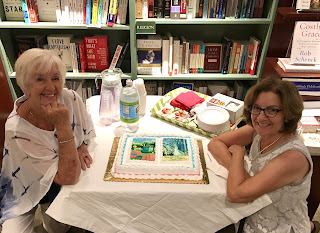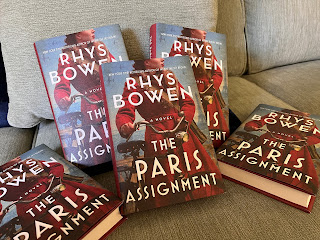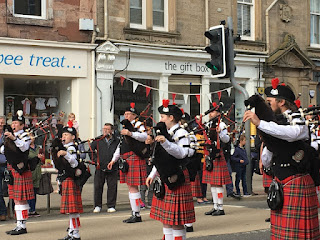RHYS BOWEN: It is my pleasure to host Laura Jensen Walker today. A lady after my own heart, writing about overlooked women in WWII. I am also determined to highlight bravery that has long been ignored and in this book Laura features some of the very bravest of all. What's more, Laura is the real deal, an airforce veteran herself. Tell us about them, Laura:
LAURA JENSEN WALKER:
Thank you, Rhys, and the rest of the Reds for having me here today—my first time on Jungle Reds! (And thanks to dear Catriona McPherson, for introducing me to Rhys.)
I’m thrilled to bits to share that my historical debut, DEATH OF A FLYING NIGHTINGALE, releases on 9/10. It is my privilege to shine a spotlight on a group of WWII women heroes that history has overlooked—the Flying Nightingales.
As an Air Force veteran formerly stationed at an RAF base in Oxfordshire a lifetime ago I was captivated to discover these courageous, forgotten women on an episode of Penelope Keith’s Hidden Villages. On this episode Britcom star Penelope interviewed a woman named Lilian West in the village of Down Ampney in the Cotswolds. Lilian, then in her late-nineties, thought she might be the last living member of the Flying Nightingales—air ambulance nursing orderlies—from World War II.
I was gobsmacked as I listened to Lilian relate that at the age of seventeen she joined the RAF as a volunteer nursing orderly in the Women’s Auxiliary Air Force. Lilian shared how she and the other air ambulance “nurses” were given only six weeks of training before being sent to combat zones—including the blood-soaked beaches of Normandy one week after D-Day—to bring home the wounded and care for them on the flights home.
Since the planes the nursing orderlies—dubbed “Flying Nightingales” by the press—flew on carried supplies and munitions, they couldn’t display the Red Cross emblem. Which made the Nightingales open to German gunfire. On the flights back to England, the nursing orderlies weren’t allowed to wear parachutes. They were expected to remain on board with the wounded if the plane crashed—twenty-four wounded men to a plane with a single nursing orderly on board to care for them all. The Nightingales changed bandages, emptied colostomy bags, cleared tracheotomy tubes, wedged sick bags beneath the chins of the wounded, and provided tea and comfort to soldiers with horrific injuries.
As a squeamish person who can barely stand the sight of blood, I couldn’t have borne the sights and smells those brave women endured: men with missing limbs, eyes, ears, noses… Horrible burns treated with butter. Gaping holes in chests and stomachs. Unimaginable. And yet, these courageous, British women kept calm and carried on, and never lost a man in their care.
Lilian West turned out not to be the last remaining Flying Nightingale—sadly, she died a year before I began writing this book—but her introducing me onscreen to this brave band of sisters made me say, “This needs to be a book!”
%20Joyce%20at%20107.jpg) It was the honor of my life to meet via email Edith “Titch” (Lord) Joyce, in Australia, the last remaining Nightingale, it appears. Edith (106 years old) and I corresponded regularly through her daughter Colleen with Edith graciously answering my myriad questions about life as a Flying Nightingale. She kindly gave me permission to include her anecdotes in my book and I sent her a small token of thanks. Colleen filmed her mum thanking me across the miles. When I saw this unassuming, lovely lady on my phone say, “I’m very happy about all that you’re doing and hope the book is a success…” I burst into tears.
It was the honor of my life to meet via email Edith “Titch” (Lord) Joyce, in Australia, the last remaining Nightingale, it appears. Edith (106 years old) and I corresponded regularly through her daughter Colleen with Edith graciously answering my myriad questions about life as a Flying Nightingale. She kindly gave me permission to include her anecdotes in my book and I sent her a small token of thanks. Colleen filmed her mum thanking me across the miles. When I saw this unassuming, lovely lady on my phone say, “I’m very happy about all that you’re doing and hope the book is a success…” I burst into tears.
It was my fervent desire for Edith to hold a copy of DEATH OF A FLYING NIGHTINGALE in her hands. Sadly, she died a few months after her 107th birthday long before the book’s release, which broke my heart. Luckily, I had emailed her daughter an early version and Colleen read it aloud to her mum. I am forever grateful that Edith got to hear the story of her and her fellow Flying Nightingales in this novel before she left this earth. I wept when Colleen said her mum “loved” hearing the different anecdotes she’d shared with me in the book.
Fly high, Edith.
Three very different young women serve as air ambulance “nurses,” bravely flying into WWII combat zones and risking their lives to evacuate the wounded: Irish Maeve joined the RAF after her fiancé was killed, streetwise Etta fled London’s slums in search of a better life, and farm girl Bety enlisted to prevent the wounded from dying like her brother.
Newspapers have given these women a romantic nickname, “The Flying Nightingales.” Not that there’s anything romantic about what they do. The horrific injuries they encounter daily take their toll, so when one of the Nightingales is found dead, they wonder: Was it an accident? Suicide? Or something else? After another nursing orderly dies mysteriously, it becomes clear that someone is killing the Nightingales.
Inspired by true events, this novel is a tribute to a group of overlooked WWII heroes who kept calm and carried on while the fighting raged about them. These courageous women proudly did their bit for King and country and found solace and camaraderie in the lasting friendships forged in war.
Former journalist Laura Jensen Walker is the award-winning author of several books including the bestselling, Agatha-nominated Murder Most Sweet. Captivated by the tales of an overlooked group of WWII RAF women—the Flying Nightingales—Air Force veteran Laura knew she had to tell their story. You can find Laura at https://laurajensenwalker.com.










































